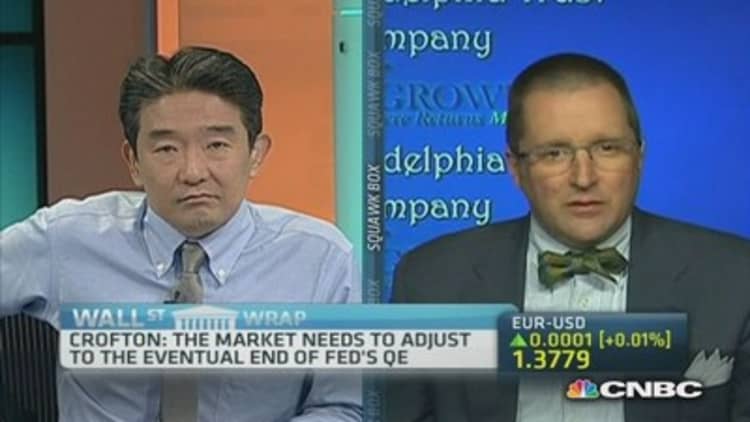When Janet Yellen addressed the media for the first time as Federal Reserve chair, much was made of her comment that the central bank might think about raising rates around "six months" after winding down its asset purchases.
Many in the press hyperventilated that it was a big "gaffe" that had terrified markets because it signaled that the Fed was pushing ahead its timetable for interest rate hikes from late 2015 until the middle of 2015. How could Yellen go so badly off script when she didn't need to?
Those people were, to put it mildly, wrong.
While stocks did sell off a bit following the comment Wednesday, they recovered much of their losses by the end of the day. And they rallied again on Thursday as traders "reassessed" their interpretation of Yellen's remarks, in the words of one Reuters article.
The yield on the 10-year Treasury note finished up slightly on Wednesday, but that was at least as much a result of the consensus Fed guidance on rate-hike timing than it was anything Yellen said.
And what exactly did she say?
When pressed on what the Fed meant when it said it would hold rates at effectively zero for a "considerable period" after winding down quantitative easing, Yellen hesitated a bit. She clearly did not want to get pinned down. She said it was "hard to define." And then she did the unthinkable, saying it "probably means something on the order of around a six-month period or so."
(Read more: Yellen's debut with the media: Plenty at stake politically)
Let's grant that if she had it to do over she might take the six-month comment back (though of course we don't know for sure it wasn't an intentional move). Still, Yellen's uncomfortable body language during the exchange suggests it was unintentional.
"The 'six months' reference to timing on rate increases was a mistake," John Makin, an economist and resident scholar at the American Enterprise Institute, said in an interview. "It [was] a break from 'conditionality' that emphasize dependence on economic data—as the minutes do. She tried to qualify but I think her eagerness to please hawks and the press got the better of her."
Pantheon Macroeconomics' Ian Shepherdson agreed, saying: "I guess the pressure of the occasion got to her. Otherwise her performance was solid, she did her best to make the dove case, having been dealt a poor hand by her colleagues, nudging up their rate forecasts."
(Read more: Efforts to kill Fannie-Freddie may already be dead)
But Yellen's comment was hardly the story of the news conference, and it did not justify coverage like the Financial Times reporting that Yellen "stumbled in her first meeting as chairwoman of the U.S. Federal Reserve after sending signals that appear to point to earlier rises in interest rate." Nor was it true that Yellen "rattled" markets or that investors "bristled" as The Wall Street Journal reported.
In fact, such coverage and headlines look fairly silly following the market gains since Yellen concluded her first news conference.

Yellen heavily qualified her remark, saying there was no change in the Fed's plans for eventual rate increases. And market participants obviously understand that the Fed's benchmark rate will not stay where it is for eternity and that a very gradual rise is likely to begin at some point in the second half of 2015, barring big changes in the economic outlook or the rate of inflation.
The real story was that Yellen expertly wrapped the central bank's inevitable shift to a very slightly more hawkish footing in plenty of gauzy caveats and qualifications that helped the market swallow the medicine quite easily. She ditched the 6.5 percent unemployment target and gave a nod to some tightening of the labor market without discounting the plight of the long-term jobless. And she did it all with humor and relaxed ease.
(Read more: Geopolitical uncertainty clouds view on Fed outlook: CNBCsurvey)
Reporters and traders, of course, love to seize on even the slightest suggestion of unforced error and turn it into far more than is warranted. But doing that often obscures what is actually going on.
But was it really, in the words of the FT, a stumble?
—By Ben White. White is POLITICO's chief economic correspondent and a CNBC contributor. He also authors the daily tip sheet POLITICO Morning Money [politico.com/morningmoney]. Follow him on Twitter @morningmoneyben.


